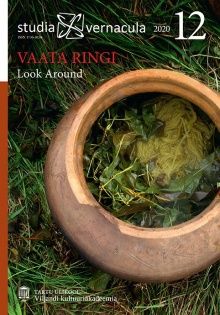Nakshi kantha – bengali traditsioonilise tikitud teki valmistamise ja tähenduse muutumine ajas / Nakshi kantha: changes in the making and meaning of a traditional Bengali embroidered blanket
DOI:
https://doi.org/10.12697/sv.2020.12.84-101Abstract
Nakshi kantha is a traditional quilt typical of Bengal, a cultural-historical area in South Asia now divided between Bangladesh and India’s West Bengal. Rural women make richly-embroidered quilts by stitching together rags embellished with various stitches to form motifs and designs that have been deliberately taken from the maker’s own habitat. The composition of the motifs renders the perception of the artisans visible, and thus it becomes the maker’s autobiography.
Once made only by joining rags embellished with endless running stitches, nowadays modern technologies (for making and decorating) and materials have been added as the blanket has reached public realms from its domestic sphere. This transition and commodification tends to elicit certain reactions either overtly or covertly.
This article is based on my MA thesis, defended at the University of Tartu, entitled ”Transformation of a Traditional Textile Craft: A Case Study of Nakshi kantha” in which I have discussed the commodification of a traditional quilt, Nakshi kantha, focusing on how a piece of domestic craft has turned into a commercialised product, how this raises questions regarding conventional thinking about the authenticity of heritage production and how this carries the essence of its historical purposes in its contemporary form. For my thesis, I have collected qualitative data by conducting interviews with the users, artisans, and the entrepreneurs, who all shared stories of their affiliation with this form of heritage production and its transformation.
With its various functions and metaphorical meanings, this embroidered textile craft has been valued as a part of Bengali heritage. Since undergoing commercialisation in the recent past, the quilt has become very popular as a memento of its recipient’s origins and attachment. It has enjoyed substantial market success, albeit at the price of its traditional vernacular meaning.
Keywords: Nakshi kantha, quilt, Bengal, traditional handicraft, commercialisation, heritage

